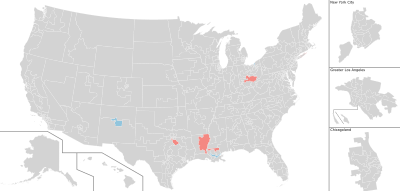
Back Élections de 2021 aux États-Unis French Kosningar í Bandaríkjunum 2021 Icelandic Verkiezingen in de Verenigde Staten 2021 Dutch 2021 Amerika Birleşik Devletleri seçimleri Turkish
| ← 2019 2020 2021 2022 2023 → Off-year elections | |
| Election day | November 2 |
|---|---|
| House elections | |
| Seats contested | 6 early-term vacancies |
| Net seat change | 0 |
 | |
| Democratic hold Republican hold No election | |
| Gubernatorial elections | |
| Seats contested | 3 (including a recall election in California) |
| Net seat change | Republican +1 |
 | |
| Democratic hold Republican gain No election | |
The 2021 United States elections were held in large part on Tuesday, November 2, 2021. This off-year election included the regular gubernatorial elections in New Jersey and Virginia. In addition, state legislative elections were held for the New Jersey Legislature and Virginia House of Delegates (the lower house of the Virginia General Assembly), along with numerous state legislative special elections, citizen initiatives, mayoral races, and a variety of other local elections. Six special elections to the United States House of Representatives also took place on November 2 or earlier as a result of either deaths or vacancies. The first of these was held on March 20.
Republican candidates made significant gains up and down the ballot.[1][2] Glenn Youngkin, the Republican nominee in the Virginia gubernatorial election, prevailed against Democratic nominee Terry McAuliffe in an upset.[3] Youngkin promised to ban the teaching of critical race theory within public schools on day one of his administration, push back against certain COVID-19 mandates and restrictions, and advocate for a low tax and small government agenda within the state of Virginia.[4][5][6] Within the factions in the Democratic Party, moderate nominees generally prevailed against left-wing candidates,[7] and progressive policies by and large saw rejection;[8][9] a proposal to defund and replace the Minneapolis Police Department was defeated.[10] The 2021 election results were largely speculated as a prelude to an incoming red wave in the 2022 midterms, but large Republican gains ultimately failed to manifest in that election.
The results were interpreted by some political commentators as a backlash against the policies of the Biden administration,[11][12] or cultural liberalism and wokeism within the party.[13][14][15] Others saw Democrats' perceived failure to enact their legislative agenda in the United States Congress as the main impetus behind Republican victories, interpreting Democratic losses as public frustration at the Biden administration not following through on its promises to implement transformative policy.
- ^ Shepard, Steven; Siders, David (November 3, 2021). "Democrats' nightmare, Republicans' resurgence: Takeaways from a big election night". Politico. Archived from the original on November 3, 2021. Retrieved November 3, 2021.
- ^ Fandos, Nicholas; Glueck, Katie (November 3, 2021). "N.Y. Democrats Assess Losses to Republicans: 'This Was a Shellacking'". The New York Times. ISSN 0362-4331. Retrieved November 4, 2021.
'Long Island is very much like the rest of the country: There was a red wave,' said Jay Jacobs, New York's state Democratic chairman and the leader of the Nassau County party. 'Republicans were energized because they're angry and they're unhappy with the direction of the country. We saw that in polls. Democrats are disheartened and unenthusiastic.'
- ^ Mucha, Sarah (November 3, 2021). "Youngkin wins Virginia governor race in upset for Democrats". Axios. Archived from the original on November 3, 2021. Retrieved November 3, 2021.
- ^ Schneider, Gregory; Vozzella, Laura (November 3, 2021). "Republican Glenn Youngkin wins Virginia governor's race". The Washington Post. Archived from the original on November 3, 2021. Retrieved November 3, 2021.
- ^ "In Virginia, Republicans see education, curriculum fears as a path to victory". NBC News. October 17, 2021. Retrieved November 3, 2021.
- ^ "Glenn Youngkin targets education in Virginia Gov. race, says he'd ban CRT". Newsweek. October 24, 2021. Retrieved November 3, 2021.
- ^ King, Maya; Kashinsky, Lisa (November 3, 2021). "Progressives win big in Boston on an otherwise tough night for the left". Politico. Archived from the original on November 3, 2021. Retrieved November 3, 2021.
- ^ McKinley, Jesse (November 3, 2021). "Buffalo mayor's race hangs in the balance with write-in ballots". The New York Times. ISSN 0362-4331. Retrieved November 3, 2021.
- ^ Milligan, Susan (November 3, 2021). "Who Lost on Election Day? Progressives". U.S. News & World Report. Archived from the original on November 3, 2021. Retrieved November 3, 2021.
- ^ Smith, Mitch; Arango, Tim (November 3, 2021). "Minneapolis voters reject an amendment to replace the Police Department". The New York Times. ISSN 0362-4331. Retrieved November 3, 2021.
- ^ Oliphant, James (November 3, 2021). "Analysis: Biden's Struggles, Education Wars Propel Youngkin's Virginia Victory". U.S. News & World Report. Archived from the original on November 3, 2021. Retrieved November 3, 2021.
- ^ Editorial Board (November 4, 2021). "Opinion | Democrats Deny Political Reality at Their Own Peril". The New York Times. ISSN 0362-4331. Retrieved November 5, 2021.
- ^ Naughtie, Andrew (November 3, 2021). "'Democrats have to come to terms with wokeism': Pundits weigh in on disaster result for the left in Virginia". The Independent. Archived from the original on November 3, 2021. Retrieved November 3, 2021.
- ^ Abernathy, Gary (November 3, 2021). "Youngkin just handed Republicans their 2022 blueprint". The Washington Post. Archived from the original on November 3, 2021. Retrieved November 3, 2021.
- ^ Leonhardt, David (October 13, 2021). "Virginia's Close Race". The New York Times. ISSN 0362-4331. Retrieved November 3, 2021.